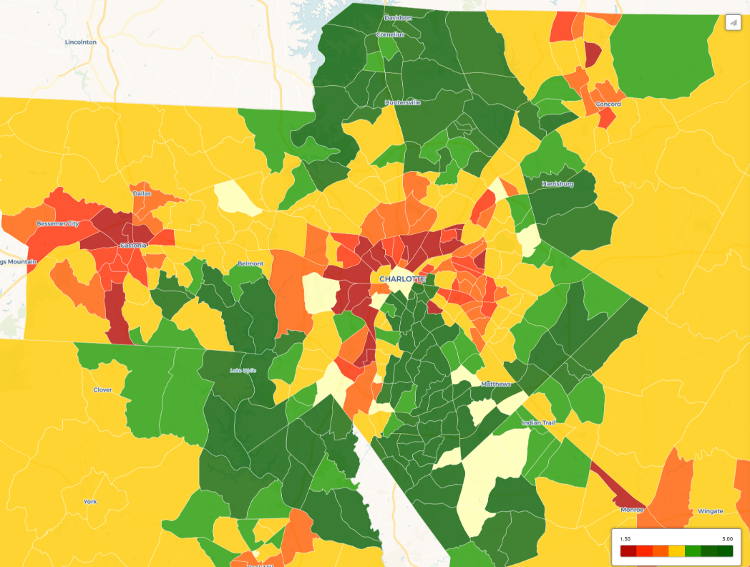Charlotte ranks among the hottest real estate markets in the U.S., following a multi-year trend of developers and investors focusing on Sun Belt cities like Charlotte for economic growth potential. According to a report from the Charlotte Observer, Charlotte is an 18-hour magnet city, with its population and job market growth making the city a migration destination for people and business.
Charlotte, North Carolina is the most populated city in the state and one of the fastest-growing metro areas in the U.S. The diverse economy and quality of life in Charlotte helps to explain why the housing market is so hot. The Charlotte metro area is the second-largest financial center in the U.S., home to popular pro sports teams, and has one of the best year-round climates in the country.
In this article we’ll discuss why Charlotte is worth considering to invest in the next year and beyond. But first, let’s take a look at some of the factors driving the real estate market in the Charlotte metropolitan area.
>>Explore Roofstock's Charlotte properties.
Population growth
Charlotte is among the fastest-growing cities in the country, with New Yorkers topping the list of new residents coming in.
As Fox 46 reports, the Charlotte metro area is growing by thousands of new residents each year. In fact, according to the most recent census, the population of the city of Charlotte increased by nearly 20% over the past decade, more than double the growth rate in the state.
With nearly 875,000 people in the City of Charlotte and over 2.6 million residents in the metropolitan area, Charlotte and Mecklenburg County have ranked near the top for population growth in the U.S. A job market that is quickly recovering and increased diversification are just two of the many reasons why so many people and businesses are moving to Charlotte.
Key Population Stats:
- Charlotte has a metropolitan population of over 2.6 million people, and is the 23rd-largest metro area in the U.S.
- Population of Charlotte has grown by 0.6% year-over-year and by 19.6% over the past 10 years, according to the U.S. Census Bureau.
- Over the past decade, the city of Charlotte has had a net population gain of over 143,000 new residents.
- Charlotte region is expected to grow by 50% by 2050, with the fastest growth rates forecast for suburban York and Lancaster counties.
Job market trends
Charlotte saw nearly 4,700 announced new jobs in Q1 2022 and nearly $2.2 billion in planned capital investment, according to the Charlotte Regional Business Alliance. Through 2028, North Carolina forecasts 300,000 new jobs, most of which will be created in Charlotte and nearby Raleigh.
The metro area is home to seven Fortune 500 companies and the country’s 2nd-largest banking center after Wall Street. Charlotte’s job market is super-charged with a high-octane blend of high-tech, white collar, and service and distribution jobs. In fact, Concord, a small suburban city in the Charlotte metro area, recently ranked as one of the top 20 fastest-growing economies in the U.S.
Key Employment Stats:
- GDP of Charlotte is over $184.8 billion, growing by nearly 65% over the past 10 years.
- Over the past year employment in Charlotte grew by 3.77% while median household incomes increased by 6.98%.
- Unemployment rate in the Charlotte metro area is 3.2%, according to the most recent report from the BLS (April 2022).
- Charlotte region added 75,491 jobs over the past 12 months, with transportation and warehousing, along with finance, insurance, and real estate seeing the most growth.
- Between now and 2028, Charlotte is projected to add nearly 137,000 new jobs.
- Charlotte ranks as the seventh-best place for business and careers, according to Forbes, and has ranked #5 as one of the best cities for jobs.
- Technology jobs in Charlotte have grown rapidly over the past five years, making Charlotte one of the cities with the highest tech talent gains.
- Charlotte is home to seven Fortune 500 companies: Bank of America, Honeywell, Nucor, Lowe’s, Duke Energy, Sonic Automotive, and Brighthouse Financial.
- Other major companies based in the greater Charlotte metropolitan area include Wells Fargo’s Regional Headquarters for East Coast Operations, Food Lion, Compass Group USA, Dixon Hughes Goodman, and chemical company Albemarle Corporation.
- Coca-Cola Bottling Co. is headquartered here and has its second-largest bottling facility in Charlotte.
- Major energy and technology companies doing business and research in Charlotte include Fluor, Piedmont Natural Gas, Siemens Energy, Toshiba, and Westinghouse.
- University of North Carolina at Charlotte, Johnson & Wales University, Charlotte School of Law, and York Technical College are just a few of the major universities and colleges in the metropolitan Charlotte area.
- 89.8% of the residents of Charlotte hold a high school degree or higher, while 36.2% hold a bachelor’s or advanced degree.
- Interstate Highways I-85 and I-77 intersect near the center of Charlotte and serve as main transportation and distribution routes to major cities throughout the east, southeast, and midwestern U.S.
- Charlotte Douglas International Airport (CLT) has provided service to nearly 50 million passengers and handled almost 180,000 tons of cargo in 2018.
- Charlotte is a major center for NASCAR, the Blumenthal Performing Arts Center attracts top performers from around the world, and the city is home to major professional sports teams like the NFL Carolina Panthers and NBA Charlotte Hornets.

Real estate market
Home prices in Charlotte are predicted to rise by 5.6% in 2022, while sales volume is expected to grow by 9.9%, according to Realtor.com’s national housing forecast. Last year, Charlotte was ranked as one of the best real estate markets in 2021 by WalletHub, and the best housing market in the Southeast in 2021 by Realtor.com.
Key Market Stats:
- Zillow Home Value Index (ZHVI) for Charlotte is $396,619 as of May 2022.
- Home values in Charlotte have increased by 30.4% over the last year.
- Over the past 5 years home values in Charlotte have increased by over 94%.
- Median list price of a single-family home in Charlotte is $400,000 based on the most recent report from Realtor.com (as of April 2022).
- Median listing price per square foot for a home in Charlotte is $223.
- Days on market (median) is 35.
- Median sold price of a single-family home in Charlotte is $401,700.
- Sale-to-list price ratio is over 104%, meaning that homes in Charlotte are selling for slightly above the asking price on average.
- Of the 163 neighborhoods in Charlotte, Myers Park is the most expensive with a median listing price of $1.4 million.
- Most affordable neighborhood for buying a home in Charlotte is Marshbrooke where the median listing price is $299,900.
Attractive renters’ market
Fast rising home prices and an influx of investors buying up houses and turning them into rental properties in Charlotte are making it more difficult for young people and lower-income buyers to purchase a home. In fact, over the last several years, surging population and the boom in high-tech and professional services jobs have helped to rank Charlotte as one of the best markets for real estate investors and developers.
Key Market Stats:
- Median rent in Charlotte is $1,900 per month for a 3-bedroom home, according to the most recent research from Zumper (as of June 2022).
- Rents in Charlotte have increased by 8% year-over-year.
- Over the last three years average rents in Charlotte have grown by around 30%.
- Renter-occupied households in Charlotte account for 43% of the total occupied housing units in the market.
- Most affordable neighborhoods for renters in Charlotte are Reid Park, Oaklawn, and Tyron Hills where rents are $975 or less per month.
- Neighborhoods in Charlotte with the highest residential rents include Third Ward, Barclay Downs, and Second Ward where rents range between $3,911 and $5,293 per month.
Historic price changes & housing affordability
Researching historical price changes and measuring the affordability of housing are two of the many metrics rental property investors use to determine the past, current, and future demand for rental real estate in Charlotte.
According to Freddie Mac’s monthly Home Price Index (FMHPI) report, home prices in the Charlotte-Concord-Gastonia MSA have grown by nearly 83% over the past five years:
- April 2017 HPI: 153.6
- April 2022 HPI: 281.0
- 5-year change in home prices: 82.9%
- One-year change in home prices: 27.3%
- Monthly change in home prices: 2.2%
Kiplinger also publishes data on home price changes and housing affordability for the top 100 housing markets in the U.S. Recent performance data for the Charlotte real estate market includes:
- Since the peak of the last real estate cycle home prices in Charlotte have declined by 12.4%.
- Since the last real estate cycle market bottom, home prices in Charlotte have grown by over 77%.
- Housing affordability in Charlotte is ranked as 4 out of 10, meaning that the Charlotte metro area is one of the more affordable places to own a home in the U.S.
Quality of life
The quality of life in Charlotte makes it the perfect place to live, work, and play for most people.
During a recent economic update presentation, Mecklenburg County (where Charlotte is located) listed nearly a dozen #1 reasons why Charlotte and North Carolina are booming.
Key Quality of Life Stats:
- Cheapest city to base your tech startup.
- Top tech momentum market.
- Metro area with the highest growth of women-owned firms.
- Best regional medical group – Carolinas Medical Center.
Get out the map
Where to begin your search? Roofstock created a heat map of Charlotte based on our Neighborhood Rating, a dynamic algorithm that enables you to make informed investment decisions by measuring school district quality, home values, employment rates, income levels and other vital investment criteria.

DARK GREEN: 4-5 star neighborhood
LIGHT GREEN: 3.5-4 star neighborhood
YELLOW: 2.5-3 star neighborhood
ORANGE: 2 star neighborhood
RED: 1 star neighborhood
Ready to invest in the Charlotte market? If you haven't already done so, create your free Roofstock account and set up alerts. We'll notify you when we have a Charlotte investment property that matches your search criteria.









